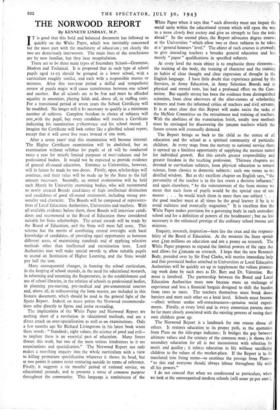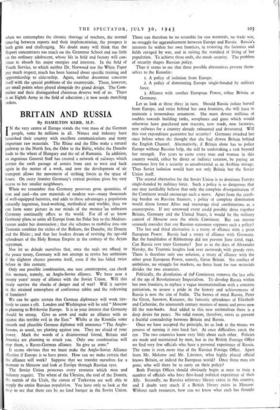THE NORWOOD REPORT
By KENNETH LINDSAY, M.P.
IT is good that this bold and balanced document has followed so quickly on the White Paper, which was inevitably concerned for the most part with the machinery of educat:on ; yet clearly the two are dexterously interwoven. The main lines of the conclusions are by now familiar, but they bear recapitulation.
There are to be three main types of Secondary School—Grammar, Modem and Technical. It is proposed that in each type of school pupils aged 11-13 should be grouped in a lower school, with a curriculum roughly similar, and each with a responsible master or mistress. After this two-year period a skilful and sympathetic review of pupils might well cause transference between one school and another. But all schools arc to be free and must be afforded equality in amenities, playing fields and, above all, in staffing ratio.
For a transitional period of seven years the School Certificate will be modified. No longer will it be necessary to qualify in a minimum number of subjects. Complete freedom in choice of subjects will rest with the pupil, but every candidate will receive a Certificate indicating his examination p trformance and his school record. I imagine the Certificate will look rather like a glorified school report, except that it will cover five years instead of one term.
After a seven years' trial this examination will become internal. The Higher Certificate examination will be abolished, but an examination without syllabus for pupils of i8 will be conducted twice a year for strictly limited purposes of matriculation and for professional bodies. It would not be expected to provide evidence
of general all-round education. Entrance to Universities, however, will in future be made by two doors. Firstly, open scholarships will continue, and their value will be made up by the State to the full amount necessary. Secondly, an annual examination will be held each March by University examining bodies, who will recommend to newly created Boards candidates of high intellectual distinction and candidates of good all-round attainment, including strong per- sonality and character. The Boards will be composed of representa- tives of Local Education Authorities, Universities and teachers. With all-available evidence before them, these Boards will interview candi- dates and recommend to the Board of Education those considered suitable for State scholarships. The actual awards will be made by the Board of Education, and the State will meet full costs. This scheme has the merits of combining central oversight with local knowledge of candidates, of providing equal opportunity as between different areas, of maintaining standards and of applying selective methods other than intellectual and examination tests. Local Authorities may well make special awards to allow suitable pupils to attend an Institution of Higher Learning, and the State would pay half the Cost.
Many consequential changes, in framing the school curriculum, in the keeping of school records, in the need for educational research, in reforming and renaming the Inspectorate, in the establishment and use of school libraries, in the relation of schools to professional bodies, in planning pre-nursing, pre-medical and pre-commercial courses and, above all, in rediscovering the form master, are included in this historic document, which should be read in the general light of the Spens Report. Indeed, on many points the Norwc,od recommenda- tions refer directly to Spens and invite re-reading.
The implications of the White Paper and Norwood Report are nothing short of a revolution in educational methods, and are a direct attack on over-specialisation as well as on examinations. Only a few months ago Sir Richard Livingstone in his latest book wrote these words : "Standard;, right values, the science of good and evil— to implant these is an essential part of education. Many forces thwart this work, but two of the most serious hindrances to it are examinations and specialisation." The Norwood Report not only makes a searching enquiry into the whole curriculum with a view to killing premature specialisation wherever it shows its head, but at two points it cannot resist venturing outside its terms of reference. Firstly, it suggests a six months' period of national service, on educational grounds, and to promote a sense of common purpose throughout the community. This language is reminiscent of the White Paper when it says that "such diversity must not impair the social unity within the educational system which will open the way to a more closely knit society and give us strength to face the tasks ahead." In the second place, the Report advocates degree courses at the Universities "which allow two or three subjects to be taken at a 'general honours' level." The object of Euch courses is avowedly to give intending teachers a broader general education and less merely " paper " qualifications in specified subjects.
At every level the main object is to emphasise three elements— the training of the body, the training of character and the training in habits of clear thought and clear expression of thought in the English language. I have little doubt that experience gained by the Services, in Army Education, in Army Selection Boards and in physical and mental tests, has had a profound effect on the Com- mittee. But equally strong has been the evidence from distinguished scientists, from close observers of the after-careers of scholarship winners and from the informed critics of teachers and civil servants. It is at once clear that this Report will make easier the tasks of the McNair Committee on the recruitment and training of teachers. With the abolition of the examination fetish, totally new methods must be envisaged for discovering the 3o0,000 teachers which the future system will eventually demand.
The Report brings us back to the child as the centre of all education and the school as a spiritual community of particular children. At every stage from the nursery to national service there is opened up a limitless opportunity of supplying the nurture suited for individual growth. But this entails greater responsibility and greater freedom in the teaching profession. Thirteen chapters are . devoted to curriculum subjects, from physical education to natural science, from classics to domestic subjects : each one seems to me distilled wisdom. But as the excellent chapter on English says, "the personality of the teacher is in the last resort a decisive influence," and again elsewhere, "by the reinstatement of the form master we mean that each form of pupils would be the special care of one master . . . he would teach them in more than one subject *. . . the good teacher must at all tinnes be the good learner if he is to avoid staleness and eventually stagnation." It is excellent that the White Paper makes provision for a governing body in each secondary school and for a definition of powers of the headmaster ; but no less necessary is the enhanced prestige of the ordinary school master and mistress.
Enquiry, research, inspection—here lies the crux and the responsi- bility of the Board of Education. At the moment the State spends over ,Croo millions on education and not a penny on research. The White Paper proposes to expand the limited powers of the 1921 Act and allows for ktoo,000 on research. I hope that the new Research Body, presided over by Sir Fred Clarke, will receive immediate help and that provincial bodies attached to Universities or Local Education Authorities will be quickly set up to supplement the valiant pioneer- ing work done by such men as Dr. Burt and Dr. Valentine. But more is involved. The partnership between the Board and Local Education Authorities must now become more an exchange of experience and less a financial bargain designed to shift the burden from rates to taxes. The teachers themselves must break down barriers and meet each other on a local level. Schools must become —albeit without undue self-consciousness—genuine social experi- ments. Finally, at every level and in every connexion parents must be far more closely associated with the existing process of seeing their own children grow up.
The Norwood Report is a landmark for one reason above all others. It restores education to its proper path, as the quotation from Plato on the title-page indicates: It bridges the gap between ultimate values and the century of the common man ; it shows that secondary education for all is not inconsistent with selection by merit_ and quality ; it relates education to life without sacrificing children to the values of the market-place. If the Report is to be translated into living terms—to continue the passage from Plato- " to this end everyone should always labour throughout life with all his powers."
I do not conceal that when we condescend to particulars, when we look at the unreorganised modem schools (still some 50 per cent.), when we contemplate the chronic shortage of teachers, the normal time-lag between reports and their implementation, the prospect is both grim and challenging. No doubt many will think that the Report concentrates too much on the Grammar School and too little on the ordinary adolescent, whose life in field and factory will con- tinue to absorb his major energies and interests. In the field of Youth Service, to which neither Dr. Norwood nor the White Paper pay much respect, much has been learned about specific training and apprenticeship to citizenship. Again, neither document concerns itself with the special problems of the countryside. These, however, are small points when placed alongside the grand design. The Com- mittee and their distinguished chairman deserve well of us. There is an Eighth Army in the field of education ; it now needs marching orders.























 Previous page
Previous page